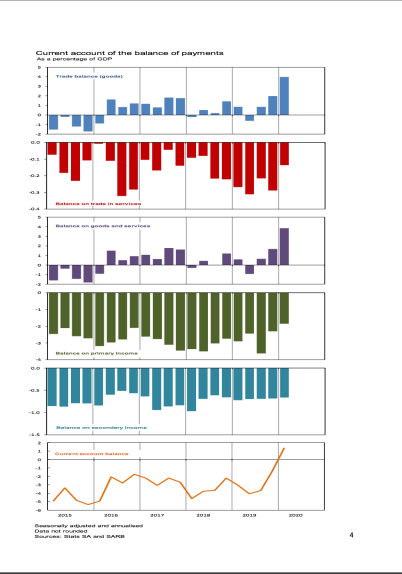The Constitution of South Africa provides the SA Reserve Bank with a mandate to “protect the value of the currency in the interest of balanced and sustainable growth”.
The long-term depreciation of the Rand has been driven by the large current account deficit SA suffers from. The current account deficit means more money is leaving SA in payments for imports of goods, services and investments than is coming in from receiving payments from exports. The largest portion of our deficit is made up of foreign investors extracting dividends and interests on their investments here.

In order to protect the value of the Rand, the SARB should be doing everything in its power to increase exports from SA and reduce imports, and ensure that South Africans gain a greater share of ownership in the companies operating here, so that less profit from local industry flows offshore.
One way it could achieve this is through low interest loans, grants and subsidies to local energy producers, farmers and manufactures.
Clearly with 28% unemployed, and vast resources of under-utilized capital and land, we have massive scope to limit inflation and achieve sustainable and balanced growth through increasing the supply of local agricultural and manufacturing goods and energy.
If local consumers buy more local product, and import less foreign product, and if local producers export more, that leads to a healthier current account, and a stronger Rand. Thus, by financing locally owned ventures, the constitutional obligation of protecting the value of the currency would be carried out, and by increasing employment, it remains true to the end goal of the SARB’s mandate: balanced and sustainable growth.
In order to ensure growth is sustainable, as our constitution obliges it to do, the SARB should invest only in the most environmentally friendly local energy industries, farming methods and products available.
Growth is neither balanced nor sustainable if it is not inclusive. In order to ensure growth is balanced and sustainable, as it obliged to do, SARB financing should be targeted towards industries and farms in which the workers share adequately in the profit, through profit-sharing schemes and by making a sensible company CEO to worker pay gap a pre-requisite qualifying criteria. For more on the many benefits of profit sharing and salary gap moderation click here.
The SARB could also invest in setting up startup capitalist companies that are wholly worker owned, in which each worker including the executive has an equal share in the company. Executives and workers could still be paid market related salaries, to attract sufficient expertise and reward skill and talent, but profit would be shared equally amongst all workers. In this scenario the economy would grow and demand would rise, but because supply would rise along with it, and we’d export more and import less, price increases would be limited and Rand value would be protected as much as possible.
It would also limit corruption, as most bribes are funded by people with large purses, and by ensuring the profit goes to workers, you reduce the possibility of corruption, and ensure that even if there is corruption, it benefits entire communities, reducing poverty broadly and improving the economy in the long run.
Imagine the effect on our economy and national psyche if the SARB used a few billion to set up a locally owned and designed car manufacturing company (using local expertise currently being used to build cars for foreign companies), in which its workers shared in the profit. The same could be said of many of the goods SA consumers import from overseas, which weakens the Rand.
And what would happen if the SARB invested in buying under-utilised agricultural land and paying people to farm there, allowing the workers on each farm to share in all the profit? You’d bring down food inflation, increase exports of farm produce (strengthening the Rand), reduce urbanisation, reduce unemployment and tackle the land issue. All of this would “protect the value of the currency in the interest of balanced and sustainable growth”!
Education is similar. The price of expertise is also determined by its supply. Investing in educating our people is one way to limit future inflation in prices of services and skills, not just because supply of skilled workers will increase, but also because more people will be empowered to be successful entrepreneurs, creating a more efficient and competitive manufacturing, agricultural companies, raising output in those sectors too.
If all these actions are constitutional, logical and possible, surely they should be considered! And once we are aware of what is possible, is it not the duty of every constitution loving citizen to demand that the SARB carries out its constitutional obligation and implement all policies and instruments logical and possible?
If you like what I’ve written, please consider contributing to my Patreon account. patreon.com/buddywells
Till recently, I have self funded my research and writing with my income as a musician and teacher. With your help, I can dedicate more time and effort to being an activist for real change in the lives of our people.
Don’t forget to follow to receive email notification of new posts.

Pingback: Neither currency stability nor balanced and sustainable growth: How SARB policy is violating South Africa’s constitution. | Buddy Wells' Blog
Info noted and supported, thank you.
Pingback: Neither currency stability nor balanced and sustainable growth - Uncensored Opinion
Pingback: Why Quantitative Easing can benefit SA | Buddy Wells' Blog
Pingback: Why the South African State & SOEs must only procure from locally listed & owned companies if we are to reduce SA’s Public Debt to GDP ratio. | Buddy Wells' Blog
Employment
Pingback: The IMF forex denominated loan: Helpful or Harmful? | Economic Thinking